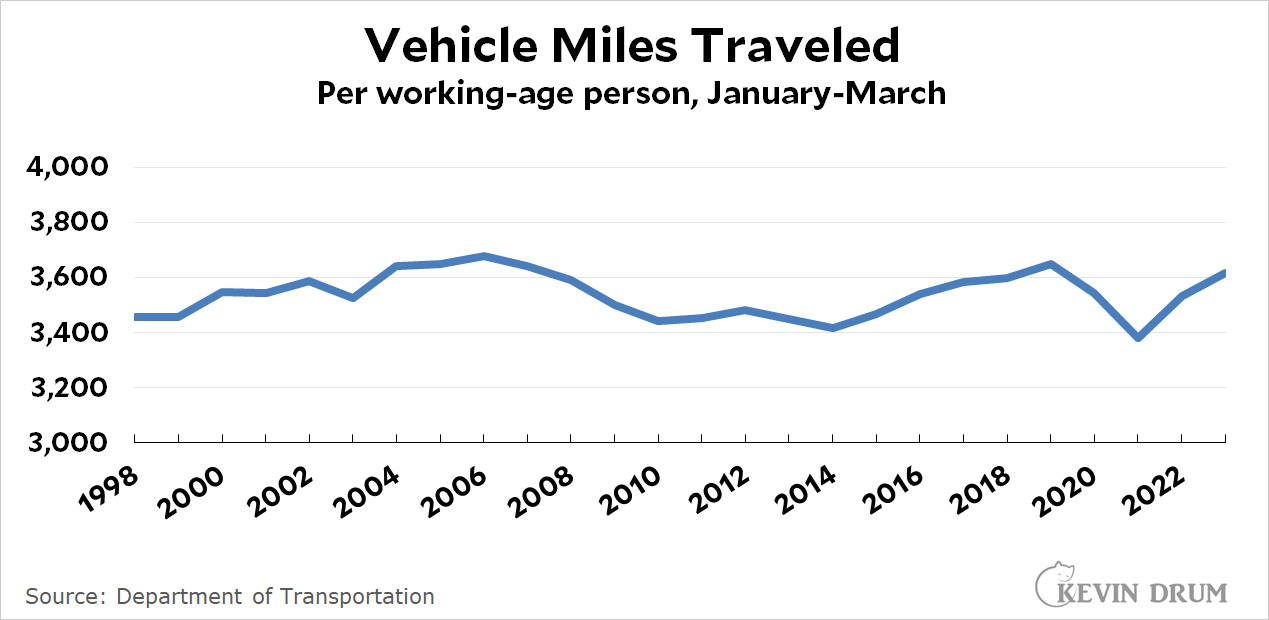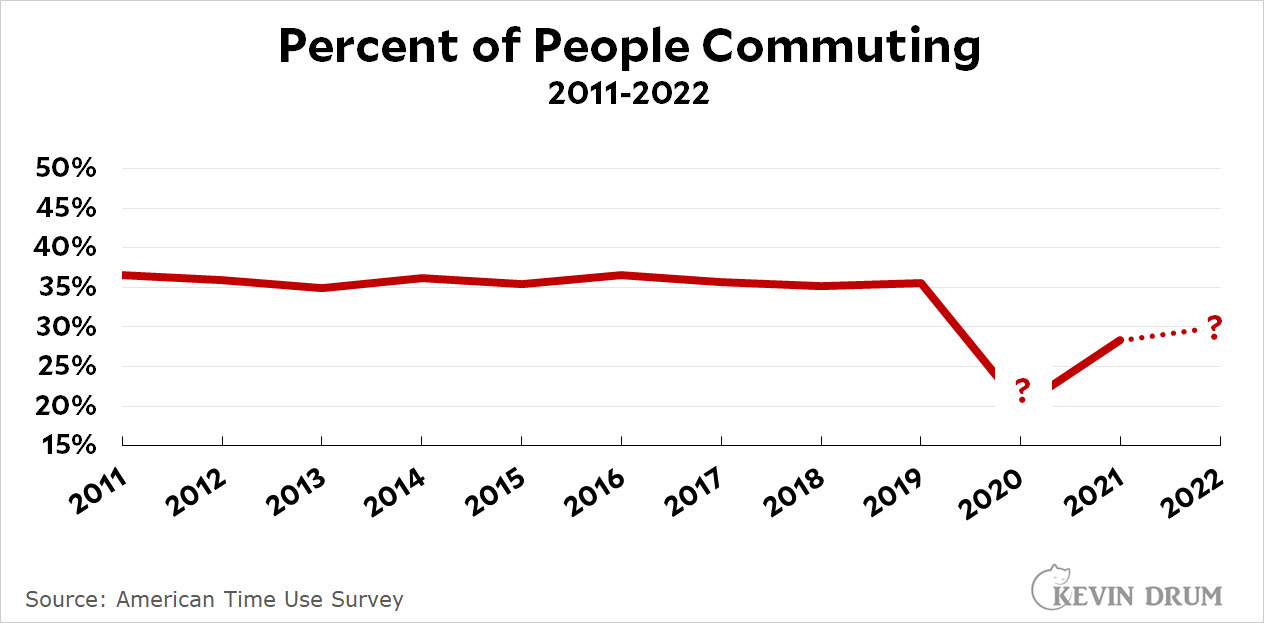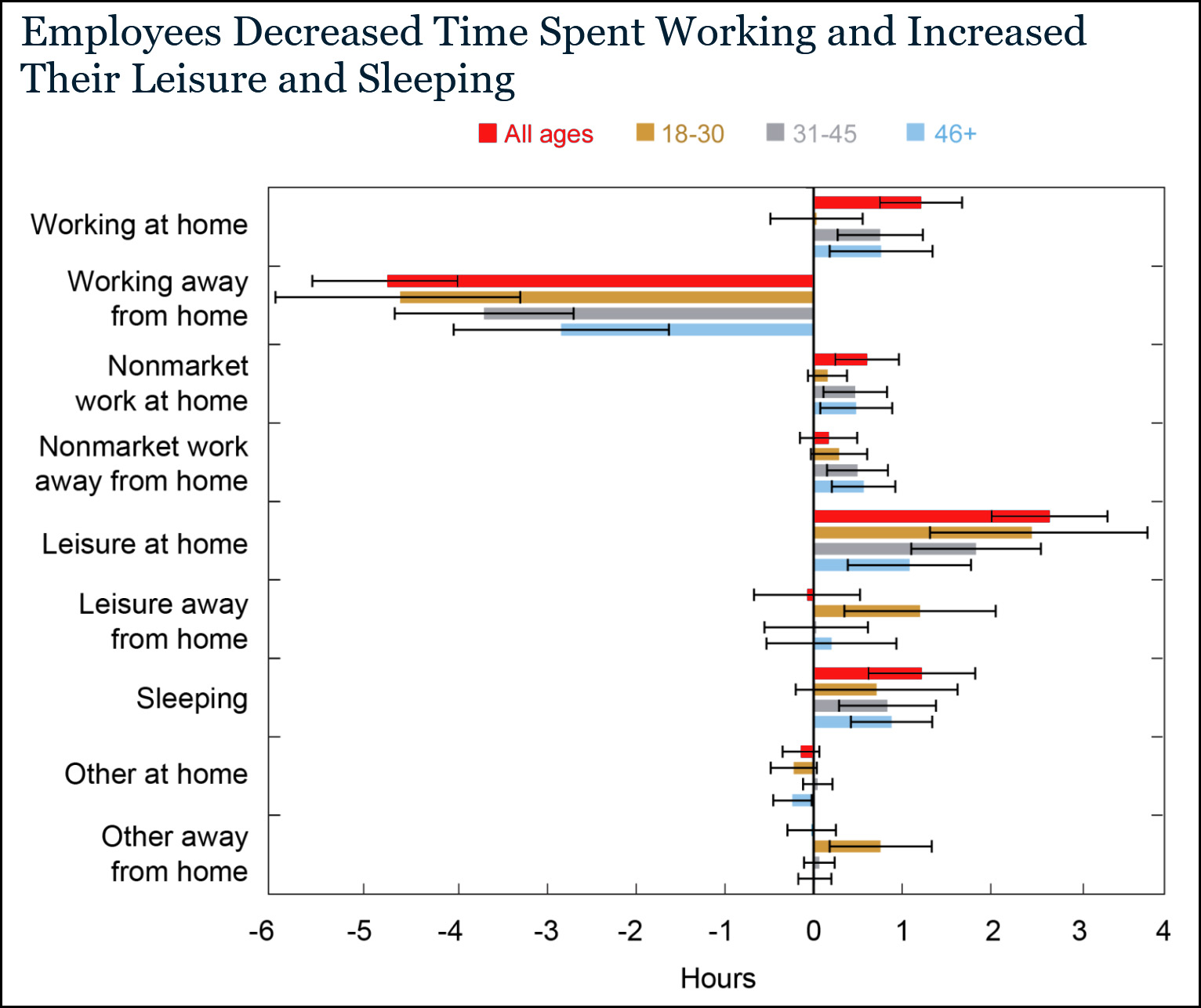A couple of days ago Farhad Manjoo wrote that office workers aren't sick of work, they're sick of the commute to work:
For many, the pandemic-era shift to remote work proved that all the schlepping was unnecessary....They can get a lot more done — in their work lives and in the rest of their lives — if they skip the commute.
Liberty Street Economics, a blog that features writing from New York Fed analysts, reported last year that collectively, Americans now spend 60 million fewer hours per day traveling to work. That’s 60 million hours for which they weren’t being compensated that they can now spend exercising, taking care of their children, getting a bit more sleep and starting their workday earlier or ending it later.
There's obviously something to this. No one likes commuting, and barren downtown office spaces offer evidence that there's less of it these days. But that 60 million hour figure is for the pandemic year of 2020 and things have changed since then. Here are a couple of suggestive charts.
First up is the crudest possible measure, Vehicle Miles Traveled per working-age person (for the first quarter of each year):
 VMT dropped substantially during the pandemic era, but it's since rebounded and is close to its pre-pandemic level. People are back to driving as much as they ever were.
VMT dropped substantially during the pandemic era, but it's since rebounded and is close to its pre-pandemic level. People are back to driving as much as they ever were.
Next up is a closer look specifically at commute times via the American Time Use Survey. This time we can go through the end of 2021 and the numbers tell a different story:
 We don't know what happened in 2020 because ATUS was interrupted during the pandemic, but it's safe to say that commutes were down—probably quite a bit. A total of 60 million hours doesn't seem unreasonable. This rebounded in 2021, but only partly: 35% of people commuted before the pandemic but only 28% in 2021—though I imagine that number has increased since then. However, average commute time among those who still commuted was barely changed, down less than two minutes.
We don't know what happened in 2020 because ATUS was interrupted during the pandemic, but it's safe to say that commutes were down—probably quite a bit. A total of 60 million hours doesn't seem unreasonable. This rebounded in 2021, but only partly: 35% of people commuted before the pandemic but only 28% in 2021—though I imagine that number has increased since then. However, average commute time among those who still commuted was barely changed, down less than two minutes.
This all suggests that, in fact, commuting is returning to its old levels, though slowly. Workers might or might not like it, but they're mostly doing it.
And one other thing. There's a reason bosses want their workers coming into the office. Here's a chart from Liberty Street Economics based on a careful analysis of what people did with the time they saved from their commute in 2020. It's pretty startling:
 Look at the red lines at the very top representing all age groups. Non-commuters worked a lot less at the office and made up for it with only a little more work at home. Altogether, in 2020, they reduced their total working time by a whopping 3.5 hours per day, replaced mostly with leisure and sleep. Their productivity might have remained strong, but they simply weren't putting in the hours. Is it any wonder that with the pandemic over, CEOs and managers want to see butts in chairs where they can be sure everyone is really working?
Look at the red lines at the very top representing all age groups. Non-commuters worked a lot less at the office and made up for it with only a little more work at home. Altogether, in 2020, they reduced their total working time by a whopping 3.5 hours per day, replaced mostly with leisure and sleep. Their productivity might have remained strong, but they simply weren't putting in the hours. Is it any wonder that with the pandemic over, CEOs and managers want to see butts in chairs where they can be sure everyone is really working?
UPDATE: The second table above originally showed commute minutes per day. I changed it to the percent of people commuting because that gives a better idea of just how much commuting has (or hasn't) fallen off following the pandemic.

There is "time at work" and there is "time working" - the two are NOT the same!
I suspect that people "working from home" spend more "time working" than they did when they went into work even if they spend less "time at work"
I was going to say, "because no one's ever goofed off at the office".
I had a very productive Covid year.
The last 2 years have been the worst working experience of my life.
Currently, I'm in the interview process with a company that's far enough away that I'm not commuting. The only reasons we're talking is because they do remote work and I'm pissed at my current employer. They've been trying to fill a position that I can fill for months. If it was on-site, well, keep looking.
And who cares if people sleep at home, I've slept at work before too. I've also had days where I've gotten 2 hours of sleep and gone back in too. No one cared. No one cared when I wrecked my physical and mental health either. You start not giving a damn after awhile.
A-fucking-men.
I manage a distributed team. We were rolling out an aggressive international expansion right as Covid hit and we shut down the offices. We decided to roll with it, and decided that we'd hire the best people we could get where ever they were, rather than requiring locality. So my folks are smeared across 3 US time zones and IST.
Now, my team is composed of senior engineers, the greenest have 10+ years experience (we manage technical infrastructure for a financial services company). But all of our metrics have been consistently up since we went remote. We simply get more done per person-hour now than we did when folks came to the office. We also have someone on the team working nearly any time of day, which has serious advantages for emergency response, which happens.
I hope that people eventually settle down enough to stop being stupid, dogmatic dipshits about this stuff. There is no moral obligation to commute to a cube farm, no matter how many op-eds over-leveraged CRE companies want to buy. But at the same time, not every job is the same, and a team of graybeard engineers is very different than a squad of 20 year-old call center associates.
I'm never going back to an office full-time, but I'm in a place where I don't have to. I suspect there's a lot of folks in the early stages of their careers who should think seriously about the tradeoffs between how nice WFH is vs. career advancement. We are social animals, and I don't care how "objective" your KPIs are, proximity matters.
There have been reports showing that WFH is hard for the new kids on the block. In that case, online mentorship is needed--but I haven't seen reports on how effective they are.
Remember, WFH doesn't work for all jobs. I'd guess even for IT services, where a lot of things can be done remotely, requires going in on occasion--or at least having someone on site.
Now why did they put that retractable cup holder on it's side on my PC?
(what???--I still remember what CD/DVD's are)
See Nicholas Bloom's last updated WFH slides.
There are at least two key slides in there addressing this. First is the % of ppl who say that have worked from home (which if you go to the Census Pulse data, also includes % of people who have WFH 5+ days a week, etc). Second is public transit use.
They are still making record breaking profits. This is all about control of the working class and business real estate values. They want to own you, mind, body and soul for at least 8 hours a day. No bathroom breaks, get back to work!!!!
That graph is approximately 0% shocking.
Commutes are basically stolen time from productive or leisure activities. It's no surprise that people slept more and got more leisure time when they didn't have to commute. Commutes steal from those two categories more than they do anything else.
As for a discrepancy between commuting and miles traveled, isn't a simple explanation that people are driving just as much, but just not to and from work? They may be using that free time to shop, or eat out, go to the park, etc. They may not be driving during rush hour.
There's also got to be a small piece of it where people are forced to drive farther for their commutes as housing becomes increasingly unaffordable.
Whenever I have the misfortune of seeing rush hour traffic, my main thought is that I hope to hell that in a hundred years, when our rush hour commutes are described to people, they'll have difficulty believing that we were so stupid as to put up with it.
The first plot understates how much driving dropped during the early stages of the pandemic. It only captures driving for Q1 (January through March). Pandemic in the US wasn’t in full swing, so to speak, until around March 15, 2020. I remember by April the roads were essentially empty. It stayed this way for a while but by January 2021, when the chart picks up again, road activity had rebounded quite a bit, even if not to pre-pandemic levels.
Any way you could post the VMT data for other quarters as well (or even just for entire years)? Thanks!
I would watch the residential real-estate markets in places like Boise, Missoula and Bend, where remote-only workers moved in search of the pastoral ideal.
If such workers are forced back into the cities with office buildings, real estate markets in those cities will get truly Medieval, and companies will have to pay even more in compensation.
Many boomers leapt out of the labor force into early retirement, and there aren't many Gen X workers because there aren't many Gen X humans.
So the age cohorts for staffing management and senior skilled positions are lean. For management, they can simply fill with thirtysomethings, which may sort of suffice, but for senior skilled workers, particularly IT crews, that option does not exist.
Gen X plus the remaining boomers, if faced with a return-to-office ultimatum, may simply jump into more lucrative management positions, where at least one has some authority to confront late requirements changes or other hallmarks of poor upper management.
This leaves even fewer senior skilled workers, who already have newfound bargaining power in the job market since 2020. Maybe their compensation will jump, or maybe they will move to remote-only contracting firms, with low overhead and plenty of pricing power.
Something has got to give. Too many Gen X workers, repeatedly squashed by recessions and the sheer number of more senior boomers in the labor force, have tasted leverage for the first time in their lives, and they are not naive.
There's another trend worth noting, Companies have learned the advantages of remote work too and are outsourcing lower paid jobs to remote corporate sites where the cost of living is lower. The boss class stays in the high priced cities, but the working stiffs have to live in a second or third tier city and accept lower pay for the same work. So much for an upward mobility path. All that office face time will get one nowhere. After all, face time, being visible to the bosses, is what RTO is all about. No boss at any company ever has given a hemi-demi-semi-shit about actually getting work done.
That's an old trend. A lot of NYC big banks have long located back office stuff in places where the cost of living is lower. I've worked for such firms in Florida and in Baltimore. The one requirement is that there still has to be an educated workforce to draw from, and good electronic infrastructure.
The data presented here certainly doesn't indicate that commuting is returning to its old levels. What an odd take.
The actual data appears to show a 20% drop in people commuting for work. This is a substantial number.
Bizarre writeup.
I was back in Baltimore last week (from which I moved last year) and traffic is certainly up since 2020 when no one was on the roads-- but at rush hour it was no where near the pre-Pandemic gridlock levels either.
This reinforces my view that:
a) The section of labor that was able to do so took advantage of pandemic-imposed work-from-home rules to claw back, in non-working hours, a portion of the income gains lost to capital over the last two generations. See: https://jabberwocking.com/raw-data-profit-vs-personal-income-in-the-united-states-1980-2022/.
b) Capital is pushing as hard as it can to reverse this claw-back, so that they can continue to enjoy the vast increase in share of national income to which they have become accustomed.
What I don't quite get is the quasi-celebratory tone from Kevin about this. What is happening is that one of the largest gains in worker income per hour worked in the last half century is being rapidly reversed. Why is that something to be cheerful about?
In short, the pandemic temporarily increased the bargaining power of tens of millions of workers. They are now slowly losing that advantage as bosses push to get pre-pandemic norms back in place.
Yay, I guess?
In 2020 we had a recession in which a lot of people were not working or working reduced schedules. That's probably what's behind the stat that people reduced their work hours. I don't recall working any less myself just because I worked at home.